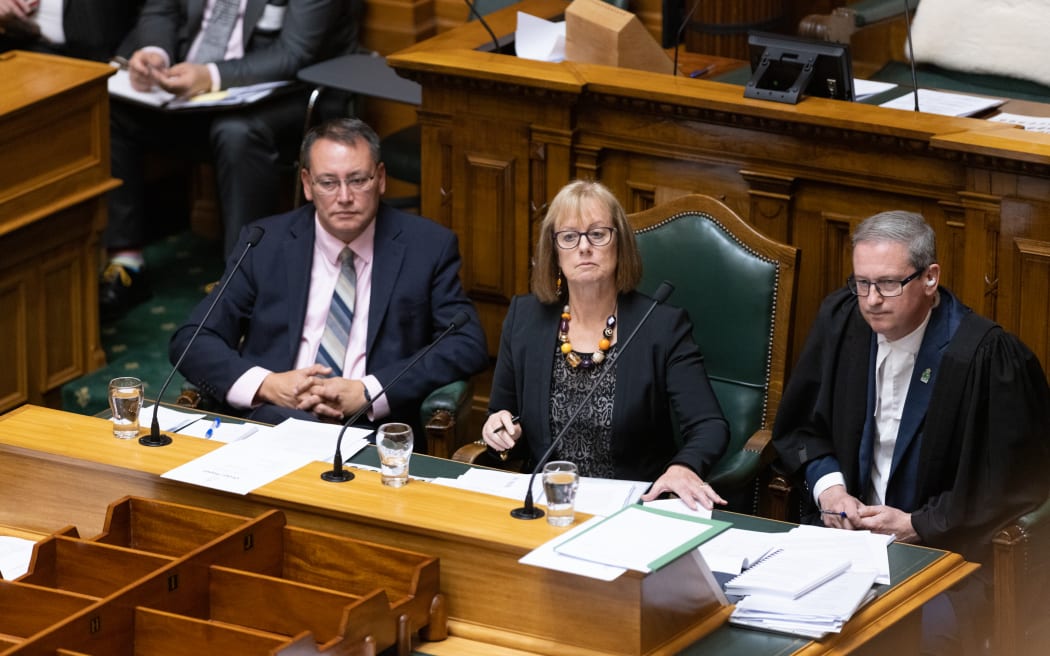This morning’s action in the chamber provided multiple examples of how difficult it can be as a presiding officer when contentious bills are going through Parliament under urgency.
One of the big challenges is refereeing debate when it gets fiery, particularly among Opposition MPs who are frustrated and angry that laws they passed are being systematically dismantled. This has become a recurring theme in the months since the 54th Parliament began, during which time there has been an unusually frequent use of urgency.

Deputy Speaker of Parliament Barbara Kuriger (centre) chairs the committee stage of the Pae Ora (Disestablishment of the Māori Health Authority) Bill, alongside Health Minister Shane Reti (left) and Clerk David Bagnall, 28 February 2024. Photo: Johnny Blades
People watching on Parliament TV today may have noticed perhaps the most fiery speech ever given by Labour leader Chris Hipkins while he was debating the Smokefree Environments and Regulated Products Amendment Bill. Pointing to evidence that the coalition government’s move to liberalise tobacco laws will be deadly and costly, he clashed with Assistant Speaker Maureen Pugh who said “do not bring the Speaker into your debate, and do not disrespect the Chair”. Hipkins denied he had brought the Speaker into it, and then claimed she’d interrupted his flow in order to do the bidding of the government, who he was also fingering during his speech for doing the bidding of the tobacco industry. He withdrew and apologised before continuing his speech.
Another reason why it’s been getting testy for those in the Speaker’s chair is because in many cases, these bills are being rushed through all stages without the opportunity for public consultation. So Opposition MPs are naturally eager during the Committee of the Whole House stage of the Bill to ask detailed questions while conveying their concerns with the legislation. It’s incumbent on the presiding officer to keep the debate on topic, and this is what Deputy Speaker Barbara Kuriger attempted this morning during the committee stage of the Pae Ora (Disestablishment of the Maori health Authority) Bill.
Some MPs were unhappy with Health Minister Shane Reti’s answers to their questions on the Pea Ora legislation. Kuriger, finding their questions to be repetitive, sought to offer some direction to MPs by advising that she was “looking for very new questions, not speeches of dissatisfaction” in the Bill. This brought her into an exchange with Green MP Ricardo Menendez-March who asked her to “reflect on why you would come into the Chair to make a reflection and then only allow for one call, rather than in good faith allow the members to scrutinise”. It ended up with Kuriger reminding Menendez-March not to argue with the Chair.
Things got more scratchy during this debate when Kuriger ruled against Labour MPs referring to the Waitangi Tribunal in relation to a claim brought to the Tribunal as a challenge to the government’s move to disestablish the Māori Health Authority, although the government subsequently decided to pass the Bill before the claim could be heard. Kuriger interrupted them repeatedly to steer the Opposition members away from discussing that Tribunal hearing during this debate. But Labour MP Duncan Webb offered the assistant speaker some guidance herself on this matter.
“The starting place in debate is that this House is free to discuss any matter, and the ruling you've made is of considerable significance in curtailing that right. Now, the Speakers' Rulings are clear, and at 38/6 it makes it very clear that "The House is not debarred from discussing a matter that is before a royal commission as would be the case if [it] were before [the courts]". “Now, the Waitangi Tribunal is a standing commission of inquiry with recommendatory powers only, and your ruling is now cutting directly across an existing Speaker's Ruling. I think, with the utmost respect, Madam Chair, that this needs to be looked at with real care, because the Waitangi Tribunal is entirely distinct from a court and the sub judice rule has no part to play,” Webb said.
After weeks of sustained urgency and contentious legislation, tempers are fraying in the House, so spare a thought for the presiding officers who spend their days sitting in the middle and often find themselves in the firing line.

